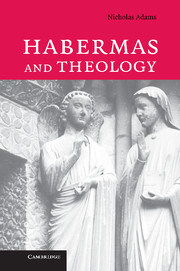Book contents
- Frontmatter
- Contents
- Preface
- 1 Religion in public
- 2 The ideal speech situation
- 3 Authority and distance in tradition
- 4 Sacred and profane
- 5 Universalism
- 6 Theology and political theory
- 7 Theology, social theory and rationalisation
- 8 Modernity's triumph over theology
- 9 Habermas in dialogue with theologians
- 10 Narrative and argument
- 11 Scriptural difference and scriptural reasoning
- List of references
- Index
6 - Theology and political theory
Published online by Cambridge University Press: 23 December 2009
- Frontmatter
- Contents
- Preface
- 1 Religion in public
- 2 The ideal speech situation
- 3 Authority and distance in tradition
- 4 Sacred and profane
- 5 Universalism
- 6 Theology and political theory
- 7 Theology, social theory and rationalisation
- 8 Modernity's triumph over theology
- 9 Habermas in dialogue with theologians
- 10 Narrative and argument
- 11 Scriptural difference and scriptural reasoning
- List of references
- Index
Summary
Habermas believes that the modern era is characterised by the breakdown of ‘religion’ as a unifying force in political life in Europe. His reason for rehearsing this is now familiar to us: there are gains and losses in such a breakdown. The gains are increases in ‘testing’ and the shift from validity claims to criticisable validity claims. The losses are the fragmenting of shared worldviews, and the corresponding unavailability of universally acknowledged authoritative criteria for testing ethical claims. Habermas' purpose in continuing the ‘unfinished project’ of modernity is to maximise the gains and minimise the losses. In his earlier work, theology plays a major part in his discussions. His account of modern political theory in Theorie und Praxis (1963) is of special interest to theologians, because it traces the fate of the role of public argumentation from Aristotle to Hegel via Aquinas, Machiavelli, More, Hobbes, Vico, Locke and Kant. Most theologians who engage with Habermas tend to focus on his later theory of communicative action, and are surprised to learn that he has so much to say about Thomas Aquinas, for example. This material is especially relevant for understanding why Habermas thinks that religious traditions are a problem in the modern public sphere. The purpose of this chapter is to reconstruct Habermas' arguments, and show why he advances them.
Habermas' history of ideas has been expertly challenged on many fronts, but most of them concentrate on his alleged misrepresentations of Hegel and Marx or his misunderstanding of Nietzsche.
- Type
- Chapter
- Information
- Habermas and Theology , pp. 106 - 123Publisher: Cambridge University PressPrint publication year: 2006

